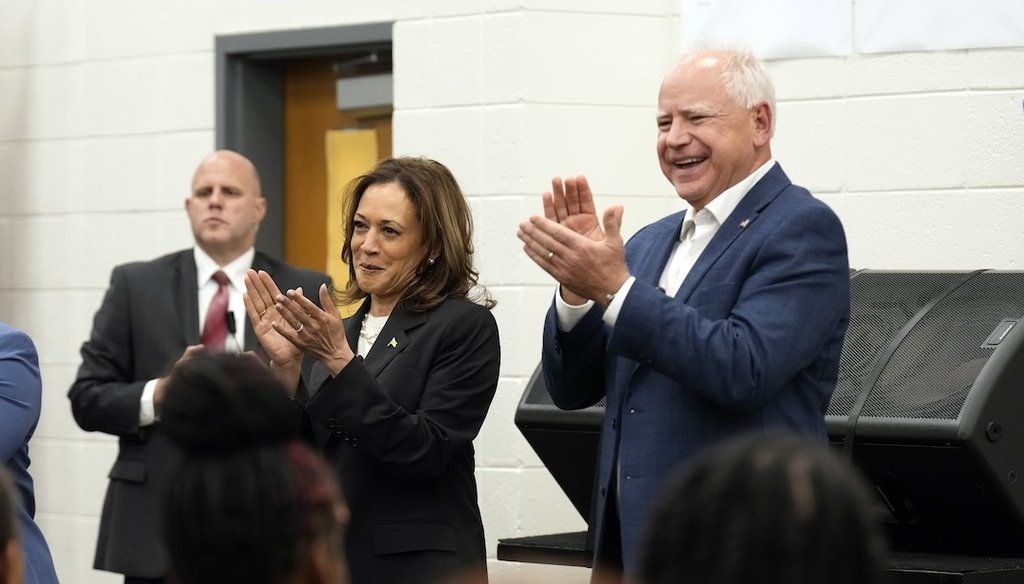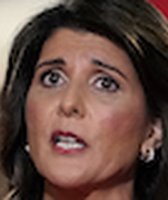Stand up for the facts!
Our only agenda is to publish the truth so you can be an informed participant in democracy.
We need your help.
I would like to contribute

Democratic presidential nominee Kamala Harris and running mate Tim Walz speak Aug. 28, 2024, to marching band members at Liberty County High School in Hinesville, Ga. (AP)
PolitiFact fact-checked Vice President Kamala Harris and her running mate, Minnesota Gov. Tim Walz, in their first joint interview since accepting the Democratic nominations for president and vice president at the party’s convention in Chicago. The segment, hosted by Dana Bash, aired Aug. 29 on CNN.
PolitiFact has rated Harris on our Truth-O-Meter 52 times since 2012, and rated Walz three times so far this year. We also fact-checked their remarks at the Democratic National Convention.
Harris: "We created over 800,000 new manufacturing jobs."
This figure is close, but it comes with caveats.
The most recent figures show the increase is slightly less than that — a gain of 765,000 manufacturing jobs added during the Biden-Harris administration. That gain followed a sharp decline in manufacturing employment during the early part of the COVID-19 pandemic, so some of the gains reflect a return of workers to existing jobs once public health conditions had improved.
Manufacturing employment is now 173,000 jobs higher than the prepandemic level. (These numbers could change in February 2025 after once-a-year revisions become official, but for now, these are the official figures.)
During the past few decades, the most common outcome after an economic recession was for manufacturing jobs to decline compared with their prerecession peak.
Comparing historical patterns 45 months since a recession’s onset, including the most recent one in 2020, reveals Biden-era manufacturing employment to be the strongest post-recession bounceback in 72 years, and the second strongest since the end of World War II.
One note: No presidents deserve full credit for creation or erosion of jobs on their watch, because other factors, from world events to technological changes, also play a role.
Harris: "I made (my opposition to fracking) clear on the debate stage in 2020 that I would not ban fracking. As vice president, I did not ban fracking. As president, I will not ban fracking."
Harris’ 2024 position supports fracking, but it wasn’t always the case. Bash recounted how Harris as a Democratic primary candidate in 2019 was against fracking, a common and controversial technique used to access hard-to-reach oil and gas in rock formations. The issue is important to voters in the key battleground state of Pennsylvania, which has experienced a fracking boom, particularly in the western part.
Harris’ response to Bash focused on her comments as President Joe Biden’s running mate in 2020, and not her strong opposition to fracking in the Democratic presidential primary. Her comments in 2020 reflected Biden’s view.
Harris said during a CNN town hall in 2019, "There's no question I'm in favor of banning fracking, so yes. And starting — and starting with what we can do on Day 1 around public lands, right? And then there has to be legislation, but yes — and this is something I've taken on in California. I have a history of working on this issue.
"And to your point, we have to just acknowledge that the residual impact of fracking is enormous in terms of the impact on the health and safety of communities."
But after Biden picked Harris as his running mate in 2020, Harris aligned with his policies, which did not involve a fracking ban. During the 2020 vice presidential debate with Republican Mike Pence, Harris said, "Joe Biden will not end fracking." Harris didn’t say she no longer supported a fracking ban, but that Biden would not pursue one.
Harris: "In the first year of being in office, (we) … extend(ed) the child tax credit so that we cut child poverty in America by over 50%"
This is accurate but needs clarification. The drop didn’t last.
The American Rescue Plan, which Biden signed in 2021, increased the annual child tax credit from $2,000 to $3,600 for children younger than 6 and to $3,000 for children 6 to 17. Beneficiaries received up to half the credit in monthly payments from July 2021 to December 2021.
Overall, supplemental poverty numbers show poverty among all U.S. children dropped from 9.7% in 2020 to 5.2% in 2021, the U.S. Census Bureau said — a 46% decline. About 5.3 million people were lifted out of poverty, including 2.9 million children.
The provision lapsed after that, facing opposition from Republicans and Sen. Joe Manchin, now I-W.Va., who argued that expanding the credit would worsen inflation. When the expanded tax credit expired, child poverty spiked. Supplemental child poverty rose from 12.1% in December 2021 to 17% in January 2022 — a 41% change. This meant 3.7 million more children were living below the poverty line.
The supplemental poverty measure, introduced in 2011, worked to update the "official poverty measure," formulated in the 1960s. The supplemental poverty measure includes cash and noncash benefits and subtracts necessary expenses — such as taxes and medical expenses — and accounts for government programs designed to assist low-income families.
Harris: "When Joe Biden and I came into office during the height of the pandemic, we saw over 10 million jobs were lost."
This is accurate. The economy lost almost 22 million jobs essentially overnight when the COVID-19 pandemic started. By the time Biden and Harris took office in January 2021, employment rebounded by about 12 million, leaving employment about 10 million jobs short of the prepandemic level.
By June 2022, employment was back to its prepandemic level. Since then, the number has risen by more than 6 million jobs.
See a claim you want us to fact-check? Email [email protected] or text "Facts" to (727) 382-4727.
CORRECTION, Aug. 31, 2024: The number of jobs lost during the novel coronavirus pandemic was 22 million. An earlier version of this story misstated the number.
Our Sources
Sources linked in article











































